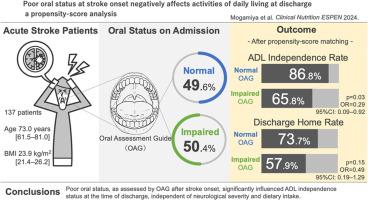中风发病时口腔状况不佳会对出院时的日常生活活动产生负面影响:倾向分数分析。
IF 2.6
Q3 NUTRITION & DIETETICS
引用次数: 0
摘要
背景与目的:中风恢复期口腔状况不佳会导致营养不良,严重影响日常生活活动,使患者无法出院回家。因此,中风后及时评估和治疗口腔疾病至关重要。本研究旨在探讨口腔状况不佳对脑卒中后日常生活自理能力恢复和出院的影响:这项单中心回顾性观察研究纳入了 137 名急性脑卒中患者,根据他们的《口腔评估指南》(OAG)评分分为两组:OAG 正常组(评分=8)和 OAG 受损组(评分≥9)。进行倾向分数匹配以尽量减少混杂变量。采用χ2检验和几率比验比较两组患者独立和出院的百分比:结果:配对后,OAG正常组和OAG受损组在神经系统严重程度和营养摄入方面没有差异。正常 OAG 组实现日常生活自理的比例(86.8%)明显高于受损 OAG 组(65.8%)(P=0.03,几率比 [OR] 0.29,95% 置信区间 [CI]0.09-0.92)。相反,出院回家的患者比例没有发现明显差异(P=0.15,OR 0.49,95%CI 0.19-1.29):本研究发现,卒中发生后口腔状况不佳是影响出院时日常生活活动独立性的一个独立因素,与神经严重程度和饮食摄入无关。本文章由计算机程序翻译,如有差异,请以英文原文为准。

Poor oral status at stroke onset negatively affects activities of daily living at discharge: A propensity-score analysis
Background & aims
Poor oral status during stroke recovery can cause malnutrition, which can markedly affect activities of daily living and prevent patients from being discharged home. Therefore, prompt evaluation and treatment of oral disorders immediately after stroke is essential. This study aimed to examine the impact of poor oral status on the post-stroke recovery of independence in activities of daily living and home discharge.
Methods
This single-center retrospective observational study included 137 patients with acute stroke, divided into two groups based on their Oral Assessment Guide (OAG) scores: the normal OAG group (score = 8) and the impaired OAG group (scores ≥9). Propensity-score matching was performed to minimize confounding variables. The χ2 test and odds ratios were used to compare the percentage of independence and home discharges between the two groups.
Results
The normal and impaired OAG groups exhibited no difference in neurological severity or nutritional intake after matching. The percentage of patients achieving independence in activities of daily living in the normal OAG group (86.8 %) was significantly higher than that in the impaired OAG group (65.8 %) (p = 0.03, odds ratio [OR] 0.29, 95 % confidence interval [CI] 0.09–0.92). Conversely, no significant difference in the percentage of patients discharged home was found (p = 0.15, OR 0.49, 95%CI 0.19–1.29).
Conclusions
This study found that poor oral status after stroke onset was an independent factor affecting independence in activities of daily living at discharge, irrespective of neurological severity and dietary intake.
求助全文
通过发布文献求助,成功后即可免费获取论文全文。
去求助
来源期刊

Clinical nutrition ESPEN
NUTRITION & DIETETICS-
CiteScore
4.90
自引率
3.30%
发文量
512
期刊介绍:
Clinical Nutrition ESPEN is an electronic-only journal and is an official publication of the European Society for Clinical Nutrition and Metabolism (ESPEN). Nutrition and nutritional care have gained wide clinical and scientific interest during the past decades. The increasing knowledge of metabolic disturbances and nutritional assessment in chronic and acute diseases has stimulated rapid advances in design, development and clinical application of nutritional support. The aims of ESPEN are to encourage the rapid diffusion of knowledge and its application in the field of clinical nutrition and metabolism. Published bimonthly, Clinical Nutrition ESPEN focuses on publishing articles on the relationship between nutrition and disease in the setting of basic science and clinical practice. Clinical Nutrition ESPEN is available to all members of ESPEN and to all subscribers of Clinical Nutrition.
 求助内容:
求助内容: 应助结果提醒方式:
应助结果提醒方式:


